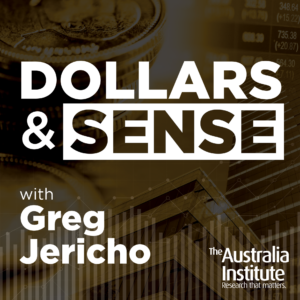Who’s hurting most from rising interest rates? It’s probably you.

Soaring house prices, high household debt and the pervasiveness of variable rate home loans mean that Australians bear the brunt of interest rate rises, says Greg Jericho.
A new report by International Monetary Fund (IMF) shows rising interest rates bite harder in some countries than others – and it’s grim reading for Australian mortgage holders.
Globally, repayments have become increasingly difficult to meet on the back of rapid rate increases.
But the new IMF World Economic Outlook report shows that rate rises hurt Australians the most.
“It mightn’t come us a surprise too many Australians, but we are right at the top – we’re number one,” Australia Institute Chief Economist Greg Jericho said on the latest episode of Dollars & Sense.
“What it’s saying is that, if interest rates went up – let’s say by one per cent in every advanced economy in the world – Australians would feel that the most.”
The prevalence of variable home loans in Australia is one of the reasons rate increases are hitting harder, according to the IMF.
“In Australia, around 85 per cent of people with a mortgage have a variable rate of some kind. That’s actually really unusual,” Jericho said.
“In the United States, 95 per cent of people with a home loan have a fixed rate mortgage. In the United Kingdom, it’s 85 per cent.
“If you’ve got a 30-year fixed rate mortgage, you really don’t care what the Reserve Bank does.”
Other drivers identified by the IMF include high levels of household debt and looser lending guidelines, but Jericho said that soaring house prices also play a big role.
A lot of debt and a lot of variable rate mortgages = Australians feeling the impact of rate rises more than elsewherehttps://t.co/abo9A25Tz5 pic.twitter.com/2plOalIvk3
— Greg Jericho (@GrogsGamut) April 11, 2024
Since 2005, median house prices have gone up by 86 per cent globally, but Jericho’s analysis shows that prices have gone up 162 per cent in Australia over the same period.
“So, just a little bit different.
“I think you can make a pretty good case…that we have some damned expensive houses.
“Things have really taken a turn for the worse over the past five, 10, 15 years – nearly 20 years really.”
As for what the Reserve Bank of Australia might do from here, the market is predicting cuts over the next 12 months, but that might be optimistic, according to Jericho.
“If Australians are hurt more by interest rate rises than elsewhere, it means they also get the benefit of rate cuts more than elsewhere.
“So the Reserve Bank might be inclined to go, ‘yeah, let’s just wait and see’.”
Dollars & Sense is available on Apple Podcasts, Google Podcasts, Spotify or wherever you get your podcasts.
Between the Lines Newsletter
The biggest stories and the best analysis from the team at the Australia Institute, delivered to your inbox every fortnight.
You might also like
Delayed RBA cut is welcome, but borrowers are still lagging
The RBA has cut interest rates – five weeks too late.
BREAKING: Australia’s housing market still cooked
Even the Mathias Cormann-led OECD says the capital gains tax discount and negative gearing are a problem.
Australians still hurting. RBA should keep cutting.
Today’s decision to cut interest rates by 25 basis points is long-overdue good news for struggling home buyers.


